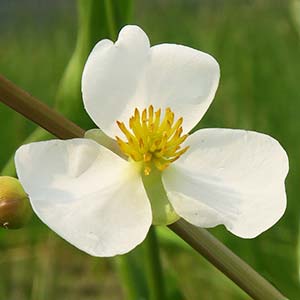Sagittaria latifolia
Sagittaria isoetiformis
bird's-eye pearlwort, broad-leaf arrowhead, common arrowhead, duck-potato, Indian potato, sagittaire latifoliee, wapato
quillwort arrowhead
emersed;
petiole triangular, erect to ascending, 6.5–51 cm;
blade sagittate, rarely hastate, 1.5–30.5 × 2–17 cm, basal lobes equal to or less than remainder of blade.
emersed or submersed, phyllodial or rarely dilated apically, flattened, 4–40 cm × 0.05–0.4(–0.5) cm.
racemes, rarely panicles, of 3–9 whorls, emersed, 4.5–28.5 × 4–23 cm;
peduncles 10–59 cm;
bracts connate more than or equal to ¼ total length, elliptic to lanceolate, 3–8 mm, delicate, not papillose; fruiting pedicels spreading, cylindric, 0.5–3.5 cm.
racemes, of 1–5 whorls, emersed, 2–20 × 1.5–12 cm;
peduncles 7–59 cm;
bracts connate more than or equal to ¼ total length, oblanceolate, 0.2–0.3 mm, delicate, not papillose; fruiting pedicels spreading, cylindric, 0.5–6 cm.
to 4 cm diam.;
sepals recurved to spreading, not enclosing flower or fruiting head;
filaments cylindric, longer than anthers, glabrous;
pistillate pedicellate, without ring of sterile stamens.
to 1.3 cm diam.;
sepals recurved to spreading, not enclosing flower;
filaments dilated, shorter than anthers, minutely tomentose;
pistillate pedicellate, without ring of sterile stamens.
heads 1–1.7 cm diam;
achenes oblanceoloid, without abaxial keel, 2.5–3.5 × to 2 mm, beaked;
faces not tuberculate, wings absent, glands (0–)1(–2);
beak lateral, horizontal, 1–2 mm.
heads 0.5–1 cm diam.;
achenes obovoid, abaxially keeled, 2.2–2.8 × 1.5–2 mm, beaked;
faces not tuberculate, wings 1–2, ± entire, glands 3–5;
beak lateral, incurved-erect, 0.2 mm.
= 22.
Sagittaria latifolia
Sagittaria isoetiformis
Sagittaria latifolia has been divided into numerous species and varieties. It was divided into two varieties, based upon the presence of pubescence over the entire vegetative plant (C. Bogin 1955; K. Rataj 1972). We have examined numerous specimens and found that many from the southeastern United States are pubescent; we believe that this character alone is insufficient for recognition of the varieties.
(Discussion copyrighted by Flora of North America; reprinted with permission.)
Sagittaria isoetiformis has often been misidentified as Sagittaria teres (E. O. Beal 1960b). The two species can be separated, however: S. teres has nearly terete phyllodia, whereas S. isoetiformis has flattened phyllodia (R. K. Godfrey and P. Adams 1964). A study of the genetics of the two species shows them to be genetically different, and the data indicate the two taxa actually should be considered at the specific level. The two species are capable of CAM photosynthesis, a process very uncommon in the genus and found among none of their supposedly closely related species (A. L. Edwards, pers. comm.).
(Discussion copyrighted by Flora of North America; reprinted with permission.)
- Local floras:
BC,
CA,
OR,
WA
- Local Web sites:
CalFlora,
CalPhotos,
Flora NW,
Go Botany,
IL Wildflowers,
KS Wildflowers,
LA Plants,
MD Biodiversity,
MI Flora,
MN Wildflowers,
MO Plants,
PNW Herbaria,
Turner Photog.
WildflowerSearch
iNaturalist (observations)
USDA Plants Database
- LBJ Wildflower Center
- SEINet
- Plants of the World Online
- Encyclopedia of Life
- Wikipedia
- Google Image Search
